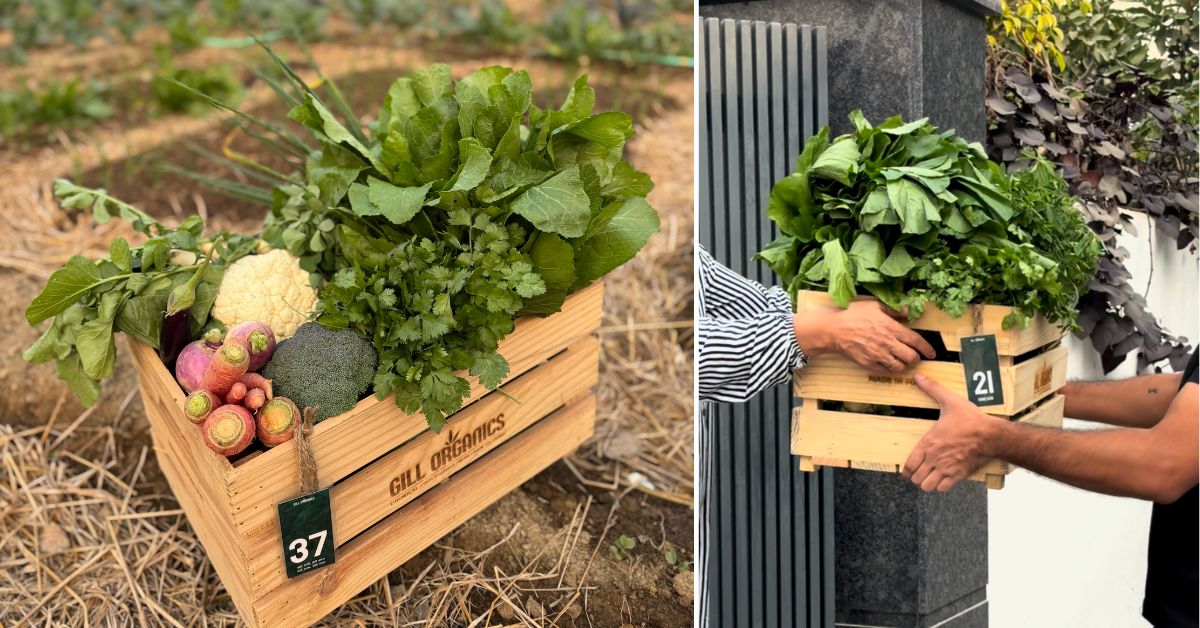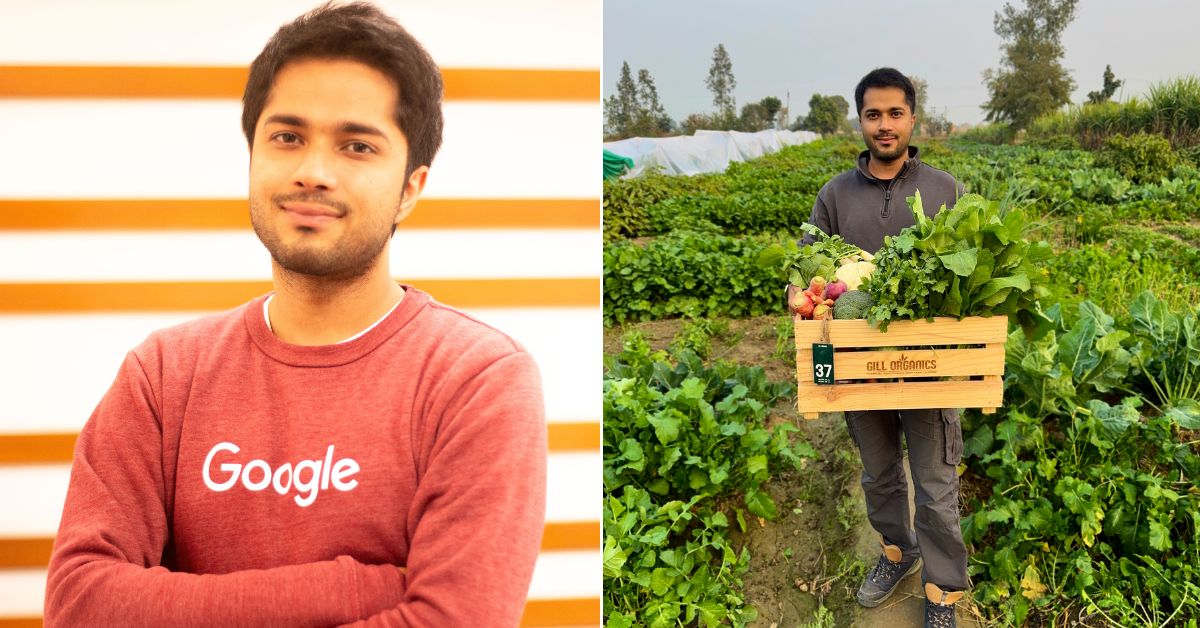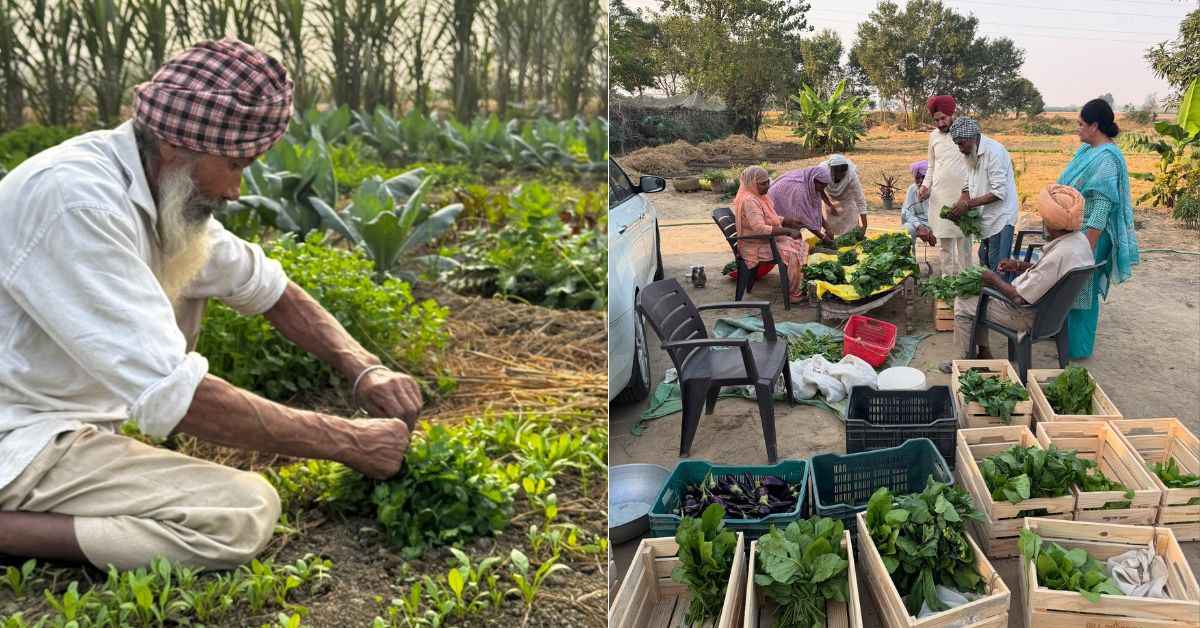Just two kilometres from the main village road in Fatehpur, in the Patiala district, you’ll find a green signboard for ‘Gill Organics’. Set up next to a large pond, this farm cultivates a wide range of vegetables — from beetroot to broccoli — in small patches of land.
Patiala-based Harpreet Singh and his family are embracing a unique approach to secure their vegetable needs. Working in real estate in the city, Harpreet does not have to worry about watering his plants or insects attacking his vegetables. Instead, he owns a small patch of land on Gill Organics’ farm for a brief period and receives freshly harvested and organically grown produce at home.
Last winter, Harpreet visited Gill Organics with his children. Together, they plucked vegetables like radishes, clicked some photos, and took the freshly harvested produce back home to the city after spending some quality time at the farm.
“That visit reminded me of my childhood when my family would grow vegetables on our farm. But as we moved to the city, we lost that comfort of chemical-free food,” he says.
Now, Harpreet’s family gets 65 percent of their vegetable needs fulfilled from their 150-square-yard patch of land.
“We get spinach, cauliflower, potatoes, onions, spring onions, bottle gourds, and much more. They don’t taste bitter compared to store-bought ones. The spinach is so good that it remains green even after cooking, while the market variety turns brown,” he says.
“Earlier, we had to dip them in vegetable washing liquids before cooking them. Now, we just wash them under running water, and they are good to go. This gives me peace of mind that my children are eating chemical-free food,” Harpreet smiles.

The brains behind this setup are cousins Mantaj Sidhu and Baljit Singh Gill, who launched Gill Organics about a year and a half ago. They established a system that allows families to access fresh, chemical-free vegetables without the intensive labour and time commitment of maintaining a full-scale farm.
“This approach is not just about personal satisfaction; it’s a conscious decision to prioritise the health of their family and the environment,” says Mantaj.
In conversation with The Better India, he explains how they are revolutionising the way urban families secure organically grown produce from the comfort of their homes.
‘Quit my job abroad to transform farming back home’
Leaving a successful career as an account manager at Google in Dublin, Mantaj returned to India in 2022. His reasons were twofold: to be closer to his family in Punjab and to address a critical issue he observed — the prevalence of food adulteration and the lack of regulation in India’s food supply chain.
“As someone who values clean and healthy eating, I wanted to ensure that my parents and by extension, others — had access to food that is safe, chemical-free, and grown sustainably,” he says.
Reflecting on the differences he observed in farming methods in India and Ireland, Mantaj shares, “These are two completely different worlds when it comes to organic farming. Firstly, it’s not as big an issue over there because agricultural produce is highly regulated, and the food is not chemically treated as excessively as it is in India. Here, we often have no idea whether the food was sprayed with chemicals once, twice, or 10 times. Sometimes, farmers overuse chemicals to ensure there are no pests and to maximise their crop yield.”

He further shares, “In Europe, the norms regarding food safety are so strict that many pesticides permissible in India are banned there. Additionally, there are thriving farmer’s markets in every city in Ireland where farmers sell their produce like vegetables, homemade jams, and other products. I think it’s just a cultural difference — such markets are well-supported, have dedicated spaces, regular schedules, and significant footfall, which is lacking in India.”
Upon returning to India, Mantaj wanted to embark on an entrepreneurial journey, and organic foods seemed the most obvious choice for him. This led him to launch his venture, Gill Organics, along with his cousin, Baljit. The duo focuses on providing access to safe, chemical-free, and sustainably grown organic food.
“The core focus of this initiative is to create a robust system that bridges the gap between the demand and supply of organic food while instilling trust in the largely misused term ‘organic’,” he points out.
A new way to bring organic food to your table
Explaining how the setup works, Mantaj says, “What makes our approach unique is that we invite people to our farm and allocate a portion of land where we grow vegetables on their behalf. We offer 18 types of vegetables, depending on the season. Families can visit for regular monitoring and pluck the produce whenever they want. For convenience, we also deliver the fresh harvest to their homes. Our setup provides complete traceability of seasonal harvests.”
Mantaj shares that the idea was to make producing organic food easier for urban families. “Living in cities, you often don’t know the source of your food. Many families desire to eat organic food but they lack sufficient land, time, and expertise to grow it. Only those deeply passionate about gardening can afford to farm,” he adds.

Before onboarding families, Mantaj insists they visit the farm to understand organic farming as well as its limitations. The farm uses cow dung and vermicompost as fertilisers, and for pest management, they rely on UV lights, sticky traps, and traditional remedies like khatti lassi (sour buttermilk).
“Mulching is another significant practice at our farm. Instead of burning stubble, we spread it across the farm. This helps organisms like earthworms thrive in the soil, and less water is needed because the soil retains moisture for longer,” he explains.
Currently, Gill Organics operates in three cities – Patiala, Ludhiana, and Chandigarh. For a six-month subscription, families are charged between Rs 30,000 and Rs 35,000.
The cousins have already partnered with 35 urban families and dedicated 1.5 acres of land to growing organic food for them. With a long waiting list of families eager to onboard, Mantaj is also focusing on expanding the land to two acres next season.
Looking back on his decision to quit a high-paying job at Google, Mantaj reflects, “My choice was met with worry and scepticism from family and friends, as leaving such a prestigious position seemed unconventional. While working at a place like Google brings financial stability and social prestige, I didn’t want to be defined by those labels.”
He continues, “Moving ad revenue numbers for big companies doesn’t give the satisfaction I feel when someone appreciates our organic vegetables, knowing they are sourcing them for their cancer-ridden parents or their pregnant wives. I’m not earning much since leaving Google, but money eventually follows. I’m glad I’m making good use of my time and skills while improving people’s lives, so I’m truly enjoying it.”
Edited by Khushi Arora; All photos: Mantaj Sidhu
No comments:
Post a Comment